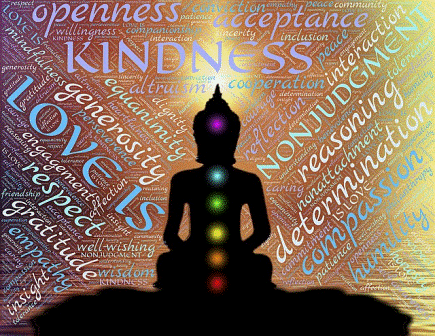The definition of kindness in the dictionary is “the quality of being friendly, generous, and considerate or a kind act.”
What does kindness mean to you?
Kindness, as I’ve seen it societally, has been on the decline, but there are some groups of us that are working together toward it making a comeback.
Kindness is awareness, a simple way of being, an act or gesture that one hopes would be natural and without effort. Kindness lacks where there is hurry.
Many times I’ve been in a health food store where the person in front of me was short on money. I have always taken care of it without a second thought. The excitement that the receiver expresses is palpable. I have given friends the necklace off my neck that they admired so, when I got the inkling to pass it on. Kindness is important to me. Perhaps because I want to live in a kinder world and I want a kinder world for our children.
I teach my kids about kindness, that it is a family value, how important it is, and how much I believe it actually rewards the giver. That is an aspect of kindness that is not often discussed, how much it rewards the giver. The instant that kindness is given, the good feeling follows. I also believe in karma, what you give, at some point in time, comes back to you. When we are on the receiving end of kindness, no matter how big or small, it needs to be acknowledged. If I am shopping or in a place of service, and someone extends an act of kindness, I will take the time to go tell their manager or contact the company to give them personal kudos.
Acknowledgement is essential, it’s a missing ingredient. Positive reinforcement prompts people to repeat good behavior. We’re very quick as a society to point out error, however, we are slow and lazy with pointing out what people do right or kind. As a child growing up, I was well aware of every single mistake I made, even with labels, however I was not reminded or familiar enough with the things I was doing right.
A compliment is kind, a smile is kind, a hug is kind, a phone call is kind, kindness comes in all shapes and sizes. My husband has a wonderful habit of returning shopping karts in store parking lots back to the store. He is a conscious advocate of random acts of kindness. It is something I adore about him.
My favorite Hilell quote states… “if not me, then who, if not now, when?” It’s on my office desk. I read it everyday.
Kindness is needed, I believe we are all hungry for it. Even when a spouse or a child expresses kindness in any way, it feels great. The best part about kindness is that it is free. It does not cost a thing and has benefits far beyond what we can imagine. I would like to help kindness make a come back. I would love to overhear people bragging about it in ordinary conversations or in the newspaper, on the news. This would be a dream. A great boss of mine had a quote she loved to use, “What we think about we talk about, and what we talk about we bring about. So, what are you thinking about? Let’s think about KINDNESS.





Thanks for this – i so agree and love to be reminded that kindness to others is a great kindness to ourselves and everyone benefits! It’s a win-win!
Wow. This is really a great blog. I love being randomly kind to strangers. When there is a little more stress and strife on folks’ plates around me, I actually feel rewarded by the feeling it gives me to see their smiles and feel their surprise and wonder, and it reduces my own stress level.
Thank you for sharing yourself and your writing.
BTW: upon writing the first comment for you, I thought : if not me, then who? if not now, when?
Smiles,
Carol Lynn
Kind post Stefanie. Thanks. Interesting take on educating children I read about recently that said we should acknowledge the fact of being kind rather than the act of kindness. For example, if a child does something nice to another child parents often say “you are so kind, I’m so proud of you…”. Now the child “knows” that he / she is kind so if they do anything unkind they refer to the knowledge that they are kind. If however the parent says “you are the kind of person that helps others when in need” they help to encourage helpful behavior for the rest of the child’s life because they are “that kind of person”. Apparently all those who helped Jews during the Holocaust were type 2 educated children, ie educated to help others in need…